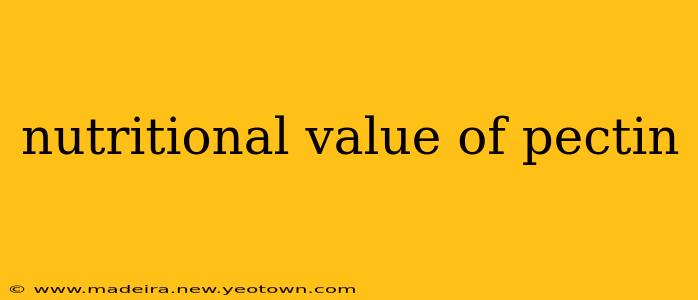Pectin. The word itself might not conjure up images of vibrant health, but this naturally occurring soluble fiber, found abundantly in the cell walls of fruits, plays a surprisingly crucial role in our well-being. It's not a vitamin or mineral that shouts for attention on nutrition labels, but its quiet influence on our digestive health and overall wellness is undeniable. Let's peel back the layers and explore the fascinating nutritional value of pectin.
What Exactly is Pectin?
Imagine the glue that holds a fruit together, giving it its firmness and structure. That's essentially what pectin is – a complex carbohydrate, a type of soluble fiber. Different fruits contain varying amounts, with apples, citrus fruits, and berries being particularly rich sources. Think of the way a jam or jelly sets – that's the magic of pectin at work, creating that characteristic gel-like texture.
What are the Health Benefits of Pectin?
The nutritional value of pectin extends far beyond its culinary applications. Its soluble fiber nature is key to its many benefits:
1. Digestive Health Superstar:
Pectin's soluble fiber acts like a sponge in your digestive tract, absorbing water and forming a gel-like substance. This helps regulate bowel movements, preventing constipation and promoting regularity. Furthermore, it feeds the beneficial bacteria in your gut, fostering a healthy gut microbiome— crucial for overall health and immunity.
2. Blood Sugar Control:
Studies suggest that pectin can help regulate blood sugar levels after meals. By slowing down the absorption of glucose into the bloodstream, it helps prevent blood sugar spikes, making it particularly beneficial for individuals with diabetes or those at risk of developing the condition.
3. Cholesterol Management:
The soluble fiber in pectin can bind to cholesterol in the digestive tract, preventing its absorption and promoting its excretion from the body. This can contribute to lowering LDL ("bad") cholesterol levels, reducing the risk of heart disease.
4. Improved Satiety:
Pectin's ability to absorb water and form a gel contributes to a feeling of fullness. This can help in weight management by curbing appetite and reducing overall calorie intake.
What are the different types of pectin?
Pectin isn't a single entity; it exists in various forms, categorized based on their degree of esterification (the amount of methyl groups attached):
- High-methoxyl pectin (HM pectin): Requires high sugar and low pH (acidic) conditions to gel. This is the type commonly used in jams and jellies.
- Low-methoxyl pectin (LM pectin): Requires calcium ions to form a gel, even in the absence of high sugar and low pH. This type is often used in low-sugar or sugar-free jams and other food applications.
Understanding these distinctions helps us appreciate the versatility of pectin in both food and potential health applications.
Is Pectin Safe for Consumption?
In general, pectin is considered safe for consumption. However, excessive intake can lead to some mild gastrointestinal side effects such as gas and bloating, particularly in individuals who are not accustomed to high-fiber diets. It's always advisable to gradually increase your pectin intake to allow your body to adapt.
How Can I Increase My Pectin Intake?
The simplest way to increase your pectin intake is by incorporating more fruits rich in pectin into your diet. Apples, oranges, grapefruit, lemons, limes, and berries are excellent choices. You can also explore pectin-rich products like fruit juices (especially those made from concentrate) or certain commercially available pectin supplements, though always consult your doctor before starting any new supplement regimen.
Conclusion: The Quiet Power of Pectin
Pectin, often overlooked, is a nutritional powerhouse quietly working behind the scenes to support our health. Its contribution to digestive health, blood sugar control, cholesterol management, and satiety makes it a valuable component of a balanced diet. So, the next time you bite into a juicy apple or savor a spoonful of homemade jam, remember the unsung hero—pectin—and its remarkable contributions to your well-being.

